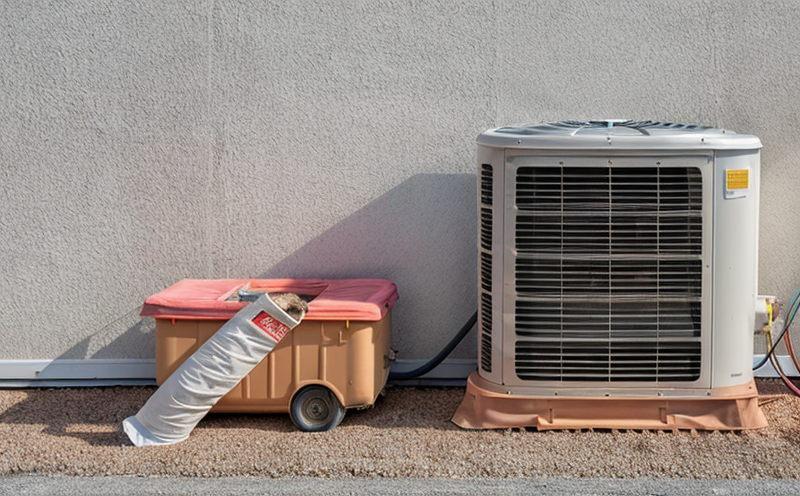Testing the Lifespan of Insulation Materials in HVAC Systems
Testing the Lifespan of Insulation Materials in HVAC Systems Unlocking Energy Efficiency and Savings
As a business owner, youre constantly on the lookout for ways to optimize energy consumption and reduce costs without compromising performance. One crucial aspect that often gets overlooked is the integrity of insulation materials in your Heating, Ventilation, and Air Conditioning (HVAC) systems. Over time, these materials can degrade, leading to heat transfer, increased energy bills, and a negative impact on the environment.
At Eurolab, our team of experts understands the importance of testing the lifespan of insulation materials in HVAC systems. Our laboratory service helps you determine the effectiveness of your existing insulation materials, identify potential problems, and make informed decisions about upgrades or replacements. By doing so, you can ensure that your business remains energy-efficient, compliant with regulations, and environmentally responsible.
Why Test the Lifespan of Insulation Materials in HVAC Systems?
Here are just a few compelling reasons why testing the lifespan of insulation materials is essential for businesses
Key Benefits of Testing Insulation Materials
Improved Energy Efficiency Regularly inspecting your insulation materials helps you identify areas where heat transfer occurs, allowing you to make targeted improvements and reduce energy consumption.
Cost Savings By optimizing insulation performance, you can minimize the need for costly repairs or replacements, saving your business money in the long run.
Enhanced Indoor Air Quality Properly functioning HVAC systems ensure a healthy indoor environment by preventing moisture buildup and reducing the risk of mold growth.
Extended System Lifespan Regular maintenance and upgrades help extend the lifespan of your HVAC system, minimizing the need for premature replacements and associated costs.
Compliance with Regulations Meeting regulatory requirements is crucial. Testing the lifespan of insulation materials ensures youre in compliance with energy efficiency standards and environmental regulations.
Increased Property Value By investing in high-quality insulation materials and regular testing, you can enhance your propertys value and appeal to potential tenants or buyers.
The Consequences of Neglecting Insulation Material Testing
If left unchecked, degraded insulation materials can lead to
Increased Energy Consumption Heat transfer reduces energy efficiency, resulting in higher bills and a greater environmental impact.
Equipment Failures Poorly maintained insulation materials can cause HVAC system failures, leading to costly repairs or replacements.
Moisture Damage Inadequate insulation allows moisture to accumulate, potentially causing damage to surrounding structures and compromising indoor air quality.
Testing the Lifespan of Insulation Materials in HVAC Systems A Comprehensive Approach
At Eurolab, our laboratory service involves a thorough evaluation of your insulation materials performance. Well analyze samples for
Thermal Resistance Measuring the materials ability to resist heat transfer and ensure optimal energy efficiency.
Moisture Content Assessing the level of moisture present in the insulation material to prevent damage or degradation.
Physical Properties Examining the materials density, thickness, and other physical characteristics to determine its overall effectiveness.
What to Expect from Eurolabs Laboratory Service
Our team will guide you through every step of the testing process
Sample Collection Well collect samples from your insulation materials for analysis.
Laboratory Testing Our experts will conduct a comprehensive evaluation using specialized equipment and techniques.
Data Analysis Well provide detailed reports and recommendations based on our findings.
Action Plan Development Collaborate with us to create a customized plan for upgrades or replacements.
QA Frequently Asked Questions about Insulation Material Testing
Q What are the benefits of testing the lifespan of insulation materials?
A Regular testing helps identify areas where heat transfer occurs, reduces energy consumption, and extends system lifespan.
Q How often should I test my insulation materials?
A Its recommended to conduct regular inspections (at least every 5-10 years) depending on usage, environmental conditions, and manufacturer recommendations.
Q Can I perform testing in-house or do I need a laboratory service?
A While some basic tests can be performed in-house, comprehensive evaluations require specialized equipment and expertise, making a laboratory service like Eurolabs the best choice for accurate results.
Q Will testing my insulation materials disrupt business operations?
A Our team ensures minimal disruption to your daily activities by working around your schedule to collect samples and conduct tests.
Q How long does the testing process take?
A The duration of our laboratory service varies depending on the scope of work, but we typically complete tests within 2-4 weeks.
Conclusion
Testing the lifespan of insulation materials in HVAC systems is a crucial aspect of maintaining energy efficiency, compliance with regulations, and environmental responsibility. By partnering with Eurolab, you can rest assured that your business will benefit from our expert laboratory service and recommendations for upgrades or replacements. Dont let degraded insulation materials compromise your bottom line invest in a more efficient future today!




